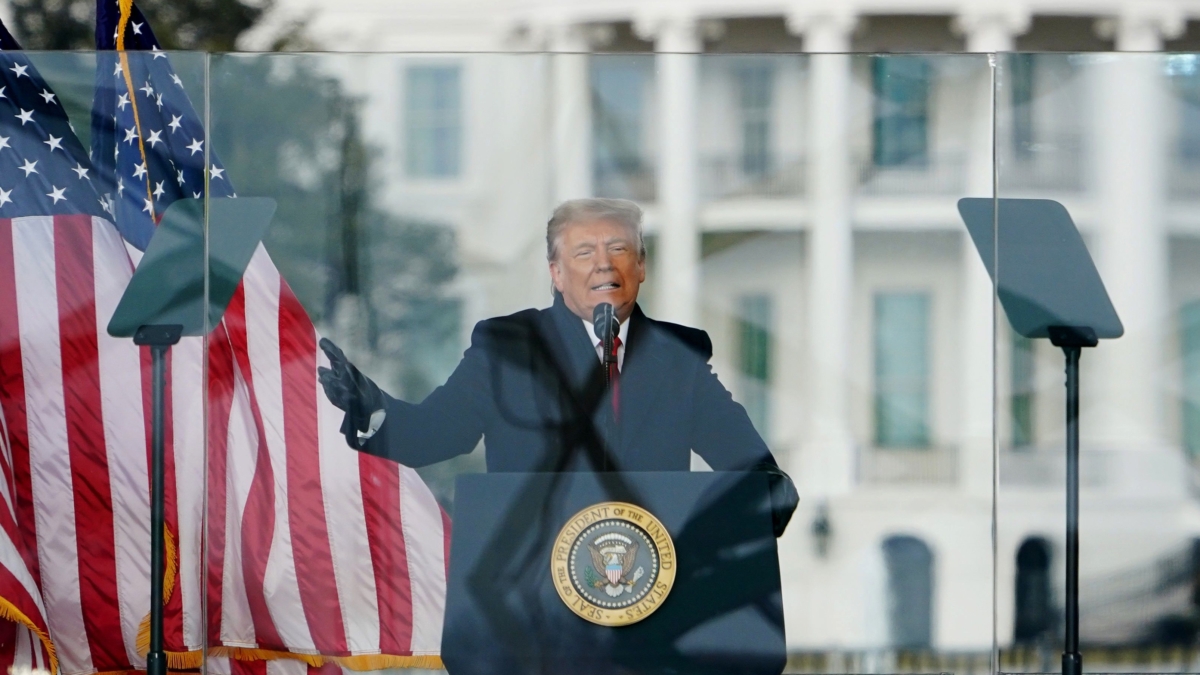Maine Secretary of State Shenna Bellows said Friday that she’s received threats after ruling former President Donald Trump ineligible for the state’s 2024 primary ballot.
“I was prepared for the possibility of threats, and I really appreciate law enforcement and the people around me who have been incredibly supportive of my safety and security,” Ms. Bellows, a Democrat, said during a Dec. 29 appearance on CNN.
“My safety and security is important, so is the safety and security of everyone who works with me, and we have received threatening communications—those are unacceptable,” she added.
Ms. Bellows didn’t provide any details about the types of threats she allegedly received, but she has faced a torrent of public condemnation—both online and off—for her unilateral Dec. 28 decision to remove President Trump from Maine’s 2024 primary ballot, citing Section 3 of the 14th Amendment.
Known as the disqualification clause, this section bars certain individuals from holding public office if they have engaged in an “insurrection or rebellion.”
The Disqualification
Most of the 14th Amendment challenges to President Trump’s eligibility as a presidential candidate played out before the courts, but Ms. Bellows (whose office oversees elections in Maine) took the decision herself.
“I conclude that Mr. Trump’s primary petition is invalid,” Ms. Belows wrote in her ruling. “Specifically, I find that the declaration on his candidate consent form is false because he is not qualified to hold the office of the President under Section Three of the Fourteenth Amendment.”
She cited the Jan. 6, 2021, breach of the U.S. Capitol as justification for her decision, arguing that President Trump “used a false narrative of election fraud to inflame his supporters and direct them to the Capitol to prevent certification of the 2020 election and the peaceful transfer of power.”

Democrats and Republicans—including President Trump’s GOP rivals in the 2024 race for the White House—have criticized the move.
President Trump’s campaign condemned the decision and called Ms. Bellows a “virulent leftist and a hyper-partisan Biden-supporting Democrat.”
“We are witnessing, in real-time, the attempted theft of an election and the disenfranchisement of the American voter,” Trump campaign spokesperson Steven Cheung told media outlets. “Make no mistake, these partisan election interference efforts are a hostile assault on American democracy.”
The Trump campaign has said it will appeal the ruling while a Maine GOP lawmaker is pushing for Ms. Bellows’ impeachment.
‘Peacefully and Patriotically’
President Trump held a rally near the White House on Jan. 6, 2021, in which he made statements encouraging his supporters to march to the Capitol, where Congress was in the process of certifying the results of the presidential election.
While President Trump called for the day’s events to be peaceful, a group of people breached the Capitol, leading to a violent confrontation with law enforcement.
The events of that day have been the subject of widespread scrutiny and debate, with President Trump’s political opponents accusing him of inciting an “insurrection.” This allegation underpins several legal efforts to block the former president from being listed on ballots in the 2024 presidential race on 14th Amendment grounds, seeking to portray him as the instigator of the Jan. 6 incident.
These cases basically argued that the former president took part in an “insurrection” by giving an impassioned speech on Jan. 6 before the Capitol breach occurred.
Even though President Trump said in his Jan. 6 speech that protesters should “peacefully and patriotically make your voices heard,” his critics have seized on a portion of his remarks where he said “we fight like hell” and “if you don’t fight like hell, you’re not going to have a country anymore” as a call for violence.
The former president has, on numerous occasions, denied calling for violent protests while insisting he meant his remarks about fighting metaphorically.
‘Shame For Our Country’
In her ruling, Ms. Bellows claimed that “the evidence” shows that the Jan. 6 Capitol breach happened “at the behest of, and with the knowledge and support of” President Trump.
Ms. Bellows has, on a number of earlier occasions, made public statements describing the Jan. 6 Capitol breach as an “insurrection” and calling for President Trump’s impeachment.
Before her ruling, President Trump’s defense team called for her recusal from the decision-making process, citing her public statements.
Her decision to remove President Trump from the state’s ballot comes shortly after the Colorado Supreme Court ruled that he is not eligible to run for president, similarly citing Section 3 of the 14th Amendment.
The former president called the Colorado court’s ruling a politically motivated decision and a “shame for our country,” while his attorneys vowed to appeal the decision to the U.S. Supreme Court.
President Trump also recently issued a statement denying being an “insurrectionist” while labeling President Joe Biden as one, citing factors like the open border and accusing the president of “destroying” America with radical anti-fossil fuel policies.
That came after President Biden told reporters it’s “self-evident” that the former president was an insurrectionist.
From The Epoch Times


